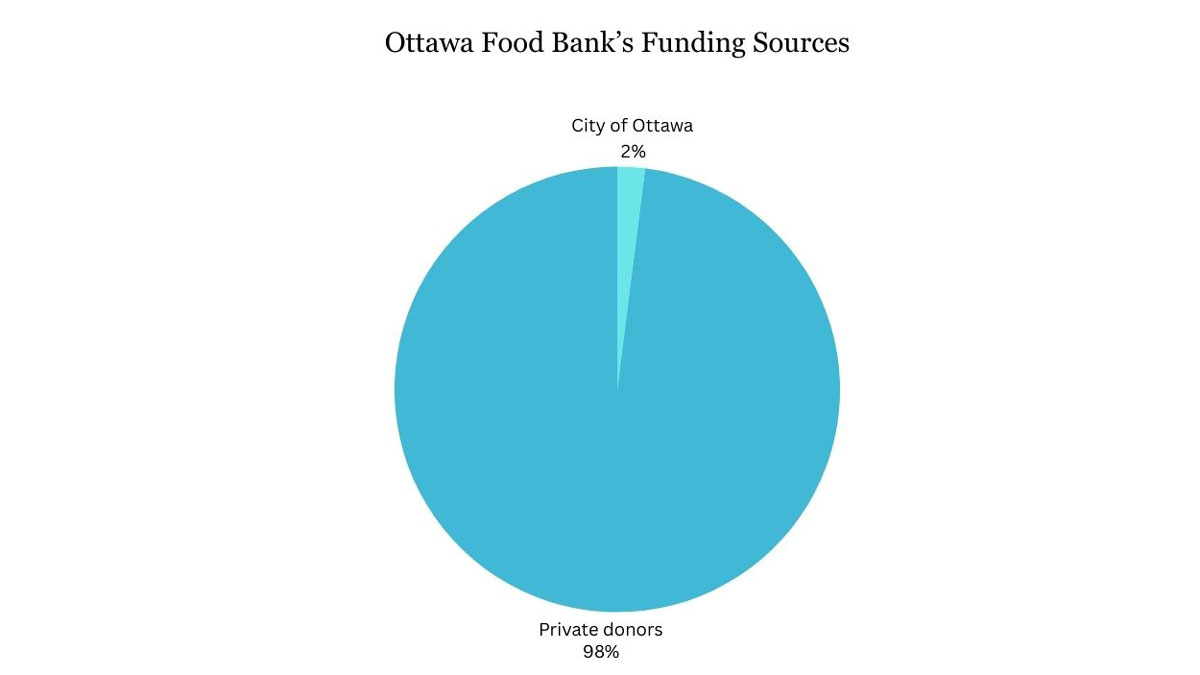Food security advocates in Ottawa are calling on all levels of government to provide more funding for food banks and declare a food insecurity emergency in the city.
Existing funding is no longer enough, advocates say, especially with rising demand for local food bank services.
Visits to the Ottawa Food Bank, for example, are 90 per cent higher than they were five years ago, said Tricia Johnson, the organization’s communications and development director. Forty per cent of the food banks across the city have turned people away because of a lack of supply, she added.
“When you hear stories from community members about going days without food, it really just breaks your heart,” Johnson said. “No one in our community, in our country should have to do that.”
The urgent appeal for greater support follows an alarming development last month in Ottawa’s charitable sector.
In January, the Ottawa Food Bank announced it would cut its overall donations to local food programs in half — including the elimination of food disbursements to some longtime partners — as a result of rising food costs and limited supplies.
Johnson said the Ottawa Food Bank receives about two per cent of its funding from the City of Ottawa and the remaining amount from private donors. It receives no funding from the provincial or federal governments, she added.

More funding is needed to ensure the organization can operate sustainably, Johnson said.
“From year to year, you’re never quite sure exactly how much (funding) you’re going to … get from the community, because sometimes funding priorities change, people’s incomes change,” Johnson said.
Rebecca Dorris, the Parkdale Food Centre’s director of advocacy, said the higher cost of living means fewer people have disposable income that they are able to donate to food banks.
The Parkdale Food Centre receives just more than 11 per cent of its funding from municipal, provincial and federal governments combined, she said, and the centre obtains the rest by fundraising and applying grants.
“I spend so much of my time searching for grants and applying for grants (instead of) meeting with people and talking to people and making change,” she said.
Despite the surging number of visits to the Parkdale Food Centre, there isn’t anywhere near a matching increase in government funding, Dorris said.
“We don’t get any more funding, but we’re somehow expected to support double the amount of people,” she said.
For the centre, more government funding would mean hiring more community members to work at the centre and more advocacy for food security, Dorris said.
Johnson said more government funding for the Ottawa Food Bank would allow the organization to purchase more food and support its existing programming.
We don’t get any more funding, but we’re somehow expected to support double the amount of people.
— Rebecca Dorris, director of advocacy at the Parkdale Food Centre
Johnson and Dorris said the city should declare a food insecurity emergency, following the lead of Toronto, Mississauga and, most recently, Kingston on Jan. 21.
“We have actually been shouting that for years,” Dorris said. “Maybe it’s time to step it up another notch.”
Alta Vista Coun. Marty Carr said there isn’t “an appetite” in Ottawa to declare a food insecurity emergency.
“There is definitely an urgency with respect to the situation with food security,” Carr said. “Declaring it as a city emergency isn’t something I think that we would be open to at this time.”
She said declaring an emergency requires an “all-of-city response,” which may not be the most effective way of addressing food insecurity.
“I think there are better ways to assist people,” Carr said. That includes advocating to provincial and federal governments for policies to lift people out of poverty, she added.
The City of Ottawa is investing $5 million in food-serving agencies in 2025, a 10-per-cent increase from last year, Carr also noted. The city has also included food security as a pillar in its poverty reduction strategy, she said.
Johnson says the city is listening, but more action needs to be taken to support food banks.
“We cannot do this on our own,” Johnson said. “We want the city to work with us … to provide the network with the funding that is severely needed.”




